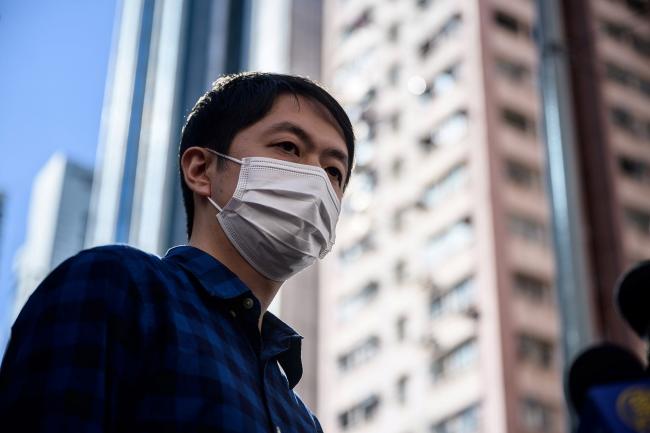(Bloomberg) -- Hong Kong Chief Executive Carrie Lam came out in defense of the city’s financial system after HSBC Holdings Plc (LON:HSBA) was criticized for freezing the accounts of a former pro-democracy lawmaker and a local church that’s helped protesters.
Lam said at a weekly briefing that Hong Kong’s monetary and financial systems are “as robust as ever.” Her comments come after former lawmaker Ted Hui, who has fled to the U.K amid a police investigation in Hong Kong, said China’s imposition of controversial new security measures has eroded faith in the city’s banking system. An HSBC spokesperson has said the bank was merely following local laws.
”If there’s any damage to Hong Kong’s financial institutions, the culprit is this individual,” Lam said. “I can assure you that Hong Kong’s monetary and financial systems are as robust as ever.”
Over the weekend, Hui said the British bank and other local lenders had frozen his and his family’s accounts in the Asian financial hub. On Tuesday, Hong Kong’s Good Neighbour North District Church accused HSBC of suspending its only bank account, as well as those belonging to the pastor Chan Hoi Hing Roy and his wife.
Shares of HSBC fell in Hong Kong, as the incidents became the latest to embroil the bank in the complicated geopolitics of the former British colony, where pro-democracy politicians have been disqualified, charged, arrested and fled into exile amid a China-backed crackdown. China’s actions have also drawn a slate of sanctions from Washington, dragging global banks into the political back-and-forth at a time when they have big expansion plans for Asia’s largest economy.
The church said in a Facebook (NASDAQ:FB) post that the bank’s actions will end hostel services for the homeless and are clearly related to its efforts to assist pro-democracy protesters during last year’s unrest.
“This is no doubt an act of political retaliation,” it said in the post. “In the past year, our group ‘Safeguard Our Generation,’ mainly comprised of middle-aged and elderly volunteers, was determined to offer humanitarian aid to protesters at the frontline.”
In a Facebook post, Hui said his family was able to transfer out their savings after the accounts were “suddenly unfrozen.” He called the matter “extremely serious” in one of his posts, saying it impacted not just his family but the confidence of HSBC’s customers everywhere.
A spokesperson for HSBC in Hong Kong declined to comment on matters concerning individual accounts, and asked that inquiries be directed to the police.
“We have to abide by the laws of the jurisdiction in which we operate,” a bank spokesperson said earlier. “While we are unable to comment on matters concerning specific account activity, we are disappointed to see the circumstances being misrepresented.”
Hong Kong police didn’t immediately respond to questions seeking comment on Tuesday. The request to block Hui’s accounts was based on a probe into his previous crowd-funding efforts, Senior Superintendent Steve Li Kwai-wah of the Hong Kong Police Force’s National Security Department said on Monday.
In an earlier statement that didn’t name Hui, the police said accounts related to a case were frozen as part of an investigation into money laundering and suspected violations of the city’s national security law, including “collusion” with foreign forces.
The Hong Kong Monetary Authority said the freezing of funds or property related to local or overseas criminal investigations is carried out by relevant law enforcement agencies. The HKMA isn’t involved in criminal investigations and doesn’t comment on individual cases, it said in response to media enquiries.
Balancing Act
The tensions have forced London-based HSBC, which derives more than a third of its revenue from Hong Kong, into a balancing act as its seeks to avoid drawing the ire of clients in the city as local police clamp down on crowd-funding efforts aimed at supporting the protest movement. The lender is also undertaking a massive restructuring, making a pivot to mainland China and Asia, away from unprofitable markets in Europe and the U.S.
Shares of HSBC slid as much as 4.4% in Hong Kong, the biggest intraday decline since September. The stock has dropped more than 30% this year.
The lender has previously been criticized as the city was engulfed by sometimes-violent protests in 2019. It became a target of protesters’ anger after closing an account linked to the city’s pro-democracy movement. HSBC was also rebuked by British and U.S. politicians after the bank’s Asia chief Peter Wong signed a petition in support of the controversial China-drafted national security law.
Hui announced last week that he was going into exile in the U.K. after fleeing to Denmark earlier. He was one of a group of people arrested last month in connection with a protest in the legislative chamber in May. Hui quit in November as part of a mass resignation by opposition legislators over the government’s ouster of four of their members.
©2020 Bloomberg L.P.

